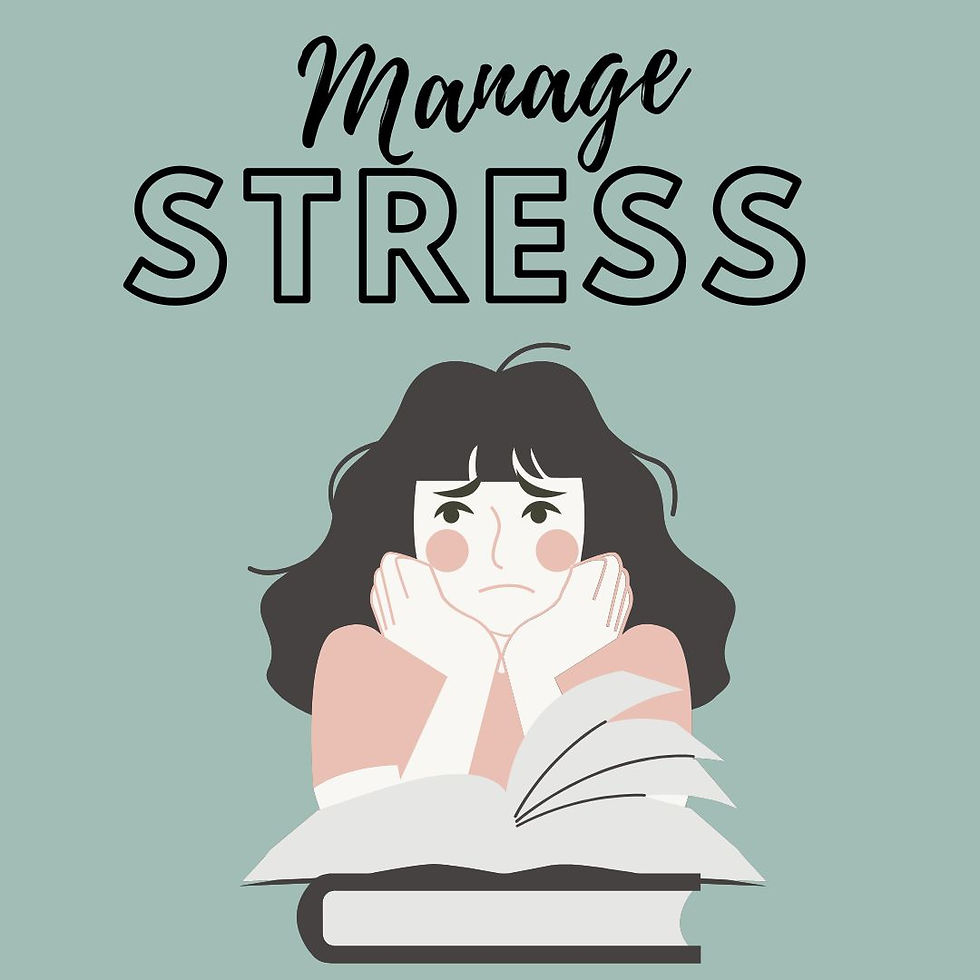Managing Mental Health During Exam Season: Tips for College Students
- Debbie Brown

- Dec 2, 2024
- 4 min read

As exam season approaches, college students often face high levels of stress and anxiety. Balancing academic pressures, personal responsibilities, and social obligations can feel overwhelming, and these demands can take a toll on mental health. Fortunately, with a few practical strategies, students can manage stress, stay focused, and protect their mental well-being. Here are some evidence-based tips to help college students maintain their mental health during exams.

1. Establish a Realistic Study Schedule
One of the biggest sources of exam stress is cramming or trying to cover too much material in too little time. Research suggests that students who plan their study schedules in advance experience less stress and perform better academically (Dunlosky et al., 2013). Breaking down study goals into smaller, manageable tasks allows students to maintain a sense of progress and reduce the pressure of last-minute studying. Use time-management tools, like calendars or study planners, to allocate time for each subject, setting achievable daily goals.
2. Prioritize Sleep
The connection between sleep and mental health is well-documented, and lack of sleep has been shown to increase stress and impair cognitive function (Walker, 2017). Yet, college students are often tempted to pull all-nighters in the days leading up to exams. Getting a good night’s sleep, however, is critical for memory consolidation and mental clarity. Aim for at least 7-8 hours of sleep each night, and try to go to bed and wake up at the same time daily. A consistent sleep routine helps ensure that your brain is well-rested and prepared for optimal performance during exams.

3. Engage in Physical Activity
Exercise is a powerful tool for managing stress and boosting mental health. Physical activity triggers the release of endorphins, which are chemicals in the brain that improve mood and reduce feelings of anxiety. Research shows that even moderate physical activity, such as a 30-minute walk, can significantly reduce stress levels and improve focus (American Psychological Association, 2018). When studying for exams, try to incorporate short breaks to stretch, take a walk, or engage in any physical activity that helps clear your mind.
4. Practice Mindfulness and Relaxation Techniques
Mindfulness-based practices, like meditation and deep-breathing exercises, are effective in reducing stress and anxiety. Mindfulness encourages focusing on the present moment, which can be especially helpful when feeling overwhelmed. Studies have shown that mindfulness can help improve emotional regulation, leading to reduced stress and enhanced focus (Kabat-Zinn, 2013). Consider dedicating a few minutes each day to a mindfulness exercise. Apps like Headspace or Insight Timer can provide guided sessions that make it easy to start.

5. Stay Connected with Supportive People
Social support plays a crucial role in managing stress and maintaining mental health. Talking with friends, family, or even classmates can help normalize the feelings of anxiety and provide comfort. A study conducted by the National Institute of Mental Health (2019) found that social support helps reduce stress and promote resilience. Remember that you’re not alone in facing exam stress, and connecting with others can provide a valuable emotional outlet.
6. Limit Caffeine and Avoid Substance Use
While coffee or energy drinks might seem helpful for staying awake, overconsumption can actually increase anxiety and disrupt sleep patterns. Research indicates that high caffeine intake is linked to heightened anxiety and poor sleep quality, which can impair academic performance (Institute of Medicine, 2001). Instead, stay hydrated with water and try to maintain a balanced diet. Likewise, avoid using alcohol or other substances to manage stress, as these can worsen mental health symptoms and interfere with your ability to study effectively.

7. Seek Professional Support if Needed
If stress becomes unmanageable or interferes with daily functioning, reaching out for professional help can be incredibly beneficial. Most colleges offer mental health services, such as counseling or therapy sessions, to support students through challenging times. Studies indicate that students who seek counseling for mental health issues report lower stress levels and better academic outcomes (Wood, 2019). Many universities offer both in-person and virtual counseling sessions, making it easier to access support, even with a busy schedule.
Conclusion
Taking care of mental health is essential for thriving both academically and personally, especially during exams. By adopting a proactive approach to self-care—such as establishing a study schedule, prioritizing sleep, and practicing mindfulness—college students can better manage stress and set themselves up for success. Remember, mental health is just as important as academic performance, and taking small steps to prioritize well-being can make a significant difference.
Find Buhl Library resources about mental health, stress, stress management, and the long-term affects of stress here.
References:
American Psychological Association. (2018). Exercise fuels the brain’s stress buffers. Retrieved from APA Website
Dunlosky, J., Rawson, K. A., Marsh, E. J., Nathan, M. J., & Willingham, D. T. (2013). Improving students’ learning with effective learning techniques: Promising directions from cognitive and educational psychology. Psychological Science in the Public Interest, 14(1), 4–58.
Institute of Medicine (US) Committee on Military Nutrition Research. (2001). Caffeine for the sustainment of mental task performance: Formulations for military operations. National Academies Press.
Kabat-Zinn, J. (2013). Full catastrophe living: Using the wisdom of your body and mind to face stress, pain, and illness. Bantam.
National Institute of Mental Health. (2019). Coping with stress: Mental health for college students. Retrieved from NIMH Website
Walker, M. P. (2017). Why we sleep: Unlocking the power of sleep and dreams. Scribner.
Wood, M. (2019). Mental health and college students: Counseling services and academic outcomes. Journal of College Student Development, 60(2), 193-202.



Comments